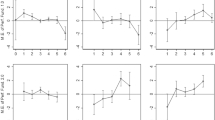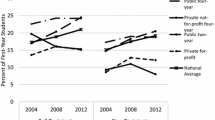Abstract
This study obtained data from 1,633 students who took the Collegiate Assessment of Academic Proficiency (CAAP) to evaluate whether the English, math, and critical thinking exams should be used as performance funding measures in the state. Analysis of Covariance (ANCOVA) was utilized to demonstrate that the use of the exams was problematic because students failed to give the assessments their best effort. Other variables in the analysis included level of English and math completed, grade point averages for English and math, cumulative grade point averages, and student characteristics. Policy implications for performance funding are also addressed in the study.
Similar content being viewed by others
REFERENCES
American College Testing Program. (1998a). CAAP User Norms. Iowa City: ACT.
American College Testing Program (1998b). CAAP Institutional Summary Report: Self-Reported Performance Effort Breakdown by Test Chance Scores. Iowa City: ACT.
Amiran, M., Schilling, K. M., and Schilling, K. L. (1993). Assessing outcomes of general education. In T. W. Banta (ed.), Making a Difference: Outcomes of a Decade of As-sessment in Higher Education, pp. 71-86. San Francisco: Jossey-Bass.
Ashworth, K. H. (1994). Performance-based funding in higher education. Change 26(6): 8-15.
Astin, A. (1990). Can state-mandated assessment work? Educational Record 71(4): 34-42.
Banta, T. W., and Fisher, H. S. (1984). In J. Folger (ed.), New Directions for Higher Education: No. 48. Financial Incentives for Academic Quality. San Francisco: Jossey-Bass.
Banta, T. W., and Pike, Gary R. (1989). Methods for comparing outcomes assessment instruments. Research in Higher Education 30(5): 455-469.
Banta, T. W., Rudolph, L. B., Van Dyke, J. V., and Fisher, H. S. (1996). Performance funding comes of age in Tennessee. Journal of Higher Education 67(1): 23-45.
Bogue, E. G., and Brown, W. (1982, November-December). Performance incentives for state colleges. Harvard Business Review, pp. 123-128.
Bracey, G. W. (1996). Altering motivation in testing. Phi Delta Kappan 78(3): 251-252.
Burke, J. C. (1998a). Performance funding: Present status and future prospects. In J.C. Burke and A. M. Serban (eds.), New Directions for Institutional Research: No. 97. Performance funding for Public Higher Education: Fad or Trend? San Francisco: Jossey-Bass.
Burke, J. C. (1998b). Performance funding indicators: Concerns, values, and models for state colleges and universities. In J.C. Burke and Serban (eds.), New Directions for Institutional Research: No. 97. Performance funding for Public Higher Education: Fad or Trend? San Francisco: Jossey-Bass.
Burke, J. C., and Serban, A. M. (1998). Editor's notes. In J.C. Burke and A. M. Serban (eds.), New Directions for Institutional Research: No. 97. Performance funding for Public Higher Education: Fad or Trend? San Francisco: Jossey-Bass.
Conley, V. M., and McLaughlin, G. W. (1999). Performance measures: How accurate are they? Paper presented at the Association for Institutional Research AIR Forum, Seattle, WA.
Ecclestone, Kathryn (1999). Empowering or ensnaring?: The implications of outcome-based assessment in higher education. Higher Education Quarterly 53(1): 29-47.
Enarson, H. (1983). Quality indefineable but not unattainable. Educational Record 64(1): 7-9.
Ewell, P. T. (1994). A matter of integrity, accountability and the future of self-regulation. Change 26(6): 25-29.
Ewell, P. T., and Jones, D. (1994). Pointing the way: Indicators as policy tools in higher education. In Sandra Rupert (ed.), Charting Higher Education Accountability: A Sourcebook on State-Level Performance Indicators. Denver, CO: Education Commis-sion of the States.
Eyler, Janet. (1984). The politics of quality in higher education. In J. Folger (ed.), New Directions for Higher Education: No. 48. Financial Incentives for Academic Quality. San Francisco: Jossey-Bass.
Folger, J. (1984). Editor's notes. In J. Folger (ed.), New Directions for Higher Education: No. 48. Financial Incentives for Academic Quality. San Francisco: Jossey-Bass.
Graham, S. W., and Cockriel, I. (1990). College outcome assessment factors: An empirical approach. College Student Journal 23(3): 280-287.
Jemmott, N. D., and Morante, E. A. (1993). The college outcomes evaluation program. In T. W. Banta (ed.), Making a Difference: Outcomes of a Decade of Assessment in Higher Education, pp. 306-321. San Francisco: Jossey-Bass.
Kuh, G. D., and Wallman, G. H. (1986). Outcomes oriented marketing. In D. Hossler. (ed.), New Directions for Higher Education: No. 53 Managing College Enrollments. San Francisco: Jossey-Bass.
Layzell, D. T. (1999). Linking performance to funding outcomes at the state level for public institutions of higher education: Past, present and future. Research in Higher Education 40(2): 233-246.
Layzell, D. T., and Caruthers, J. K. (1995). Performance Funding at the State Level: Trends and Prospects. Paper presented at the 1995 Association for the Study of Higher Education Annual Meeting, Orlando, FL. (ERIC Document Reproduction Service No. 391406)
Mayes, L. D. (1995). Measuring community college effectiveness: The Tennessee model. Community College Review 23(1): 13-21.
Pace, C. R. (1984). Historical perspectives on student outcomes: Assessment with impli-cations for the future. NASPA Journal 22(2): 10-18.
Pike, G. R. (1999). The constant error of the halo in educational outcomes research. Research in Higher Education, 40(1): 61-86.
Rothman, R. (1995). Measuring Up: Standards Assessment and School Reform. San Francisco: Jossey-Bass.
Serban, A. M. (1998). Opinions and attitudes of state and campus policymakers. In J. C. Burke and A. M. Serban (eds.), New Directions for Institutional Research: No. 97. Performance Funding for Public Higher Education: Fad or Trend? San Francisco: Jossey-Bass.
South Carolina Commission on Higher Education (1997). Performance Funding: A Re-port of the Commission on Higher Education to the General Assembly. Special Report No. 4. Columbia, SC: South Carolina Commission on Higher Education. (ERIC Document Reproduction Service No. 405786)
SPSS. (1997). SPSS Advanced Statistics 7.5. Chicago: SPSS.
Terwillinger, J. S., and Titus, J. C. (1995). Gender differences in attitude and attitude changes among mathematically talented youth. Gifted Child Quarterly 39(1): 29-35.
Van Dyke, J. V., Rudolph, L. B., and Bowyer, K. A. (1993). Performance funding. In T. W. Banta (ed.), Making a Difference: Outcomes of a Decade of Assessment in Higher Education, pp. 283-293. San Francisco: Jossey-Bass.
Yarbrough, D. B. (1992). Some lessons to be learned from a decade of general education outcomes assessment. Innovative Higher Education 16(3): 223-234.
Yorke, M. (1997). Can Performance Indicators Be Trusted? Paper presented at the 1997 Association for Institutional Research Annual Forum, Orlando, FL. (ERIC Document Reproduction Service No. 418660)
Author information
Authors and Affiliations
Rights and permissions
About this article
Cite this article
Hoyt, J.E. Performance Funding in Higher Education: The Effects of Student Motivation on the Use of Outcomes Tests to Measure Institutional Effectiveness. Research in Higher Education 42, 71–85 (2001). https://doi.org/10.1023/A:1018716627932
Issue Date:
DOI: https://doi.org/10.1023/A:1018716627932




